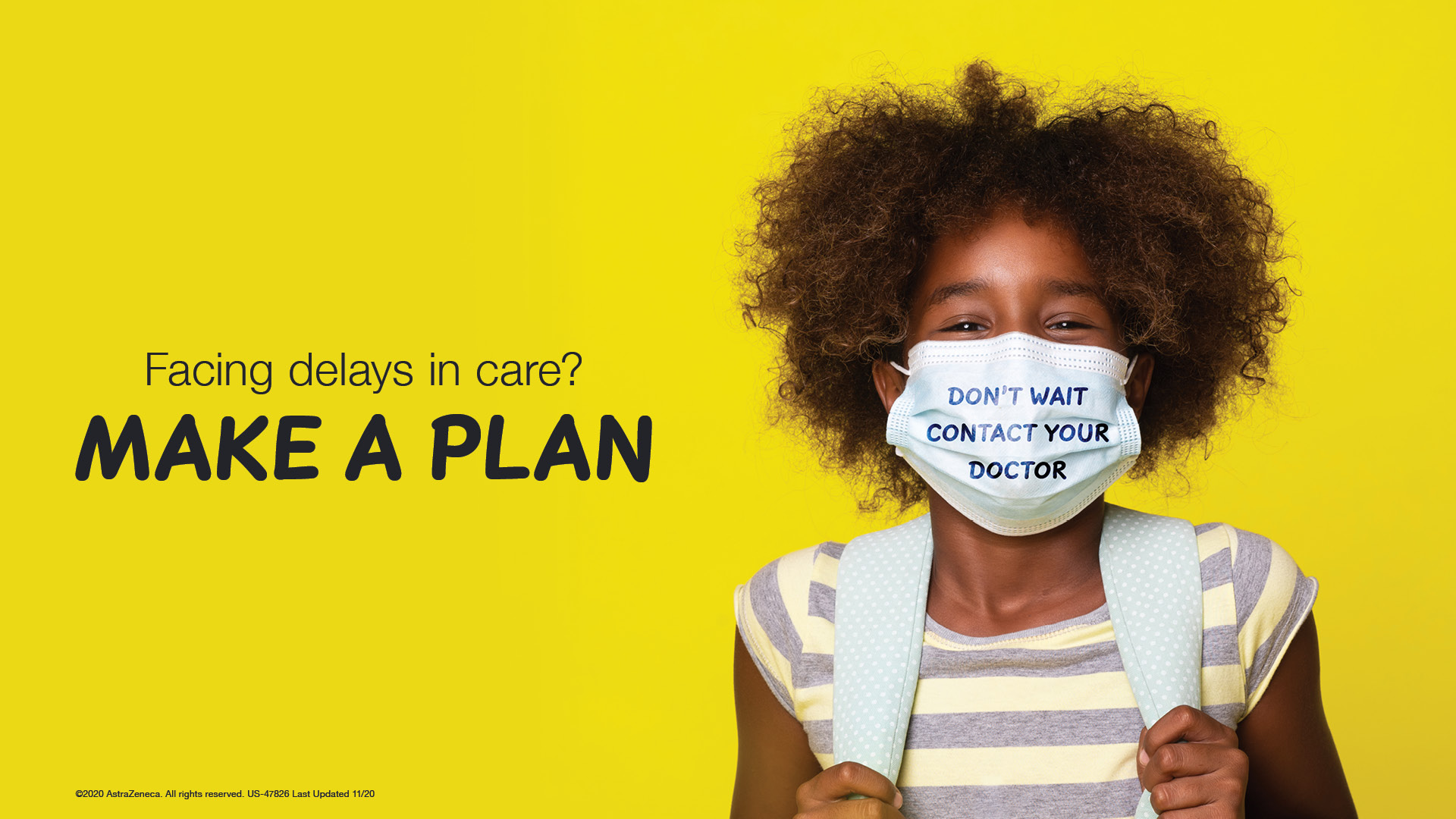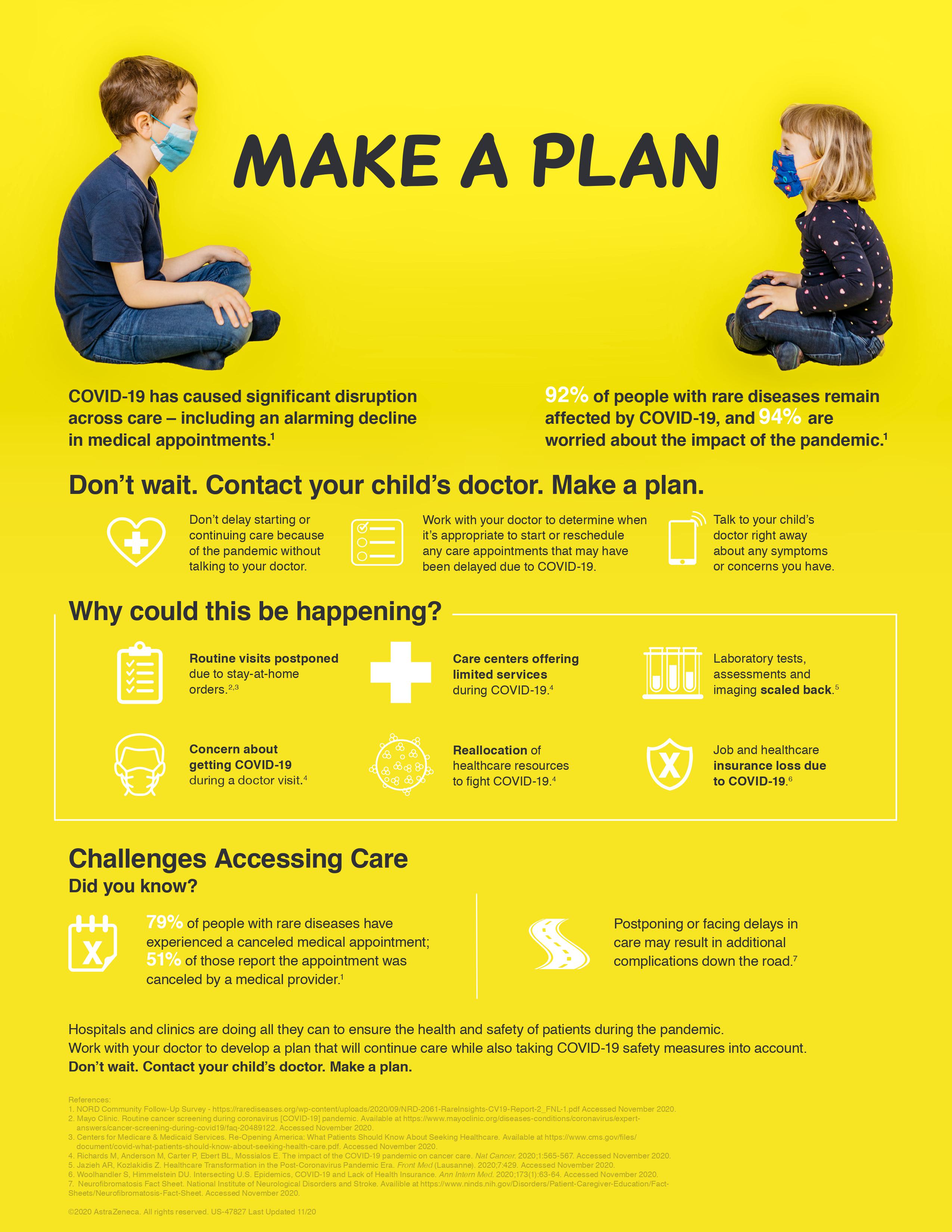 The COVID-19 pandemic has profoundly impacted healthcare, and neurofibromatosis (NF) is no exception. Families with a loved one who has NF may be postponing or facing delays in care which may result in additional complications down the road. Read on for more information and tips to help get NF care back on track.
The COVID-19 pandemic has profoundly impacted healthcare, and neurofibromatosis (NF) is no exception. Families with a loved one who has NF may be postponing or facing delays in care which may result in additional complications down the road. Read on for more information and tips to help get NF care back on track.
- In a recent survey by the National Organization for Rare Diseases, 92% of people with rare diseases remain affected by the COVID-19 pandemic and 94% are worried about the impact of the pandemic
- 79% of people with rare diseases have experienced a canceled medical appointment; 51% of those report the appointment was canceled by a medical provider
- Despite the risks and challenges associated with COVID-19, it remains important for people to stay connected with their healthcare providers
- It is crucial that patients with NF1, NF2, and schwannomatosis and their loved ones remain watchful for any new symptoms and contact their healthcare provider for evaluation and treatment, if warranted
- We encourage you to work with your care team to proactively develop a plan that will continue care while also taking COVID-19 safety protocols into account
- The first step in making a plan is to talk to your regular provider about scheduled in-person appointments. Prioritizing regular care and routine visits, as well as not delaying care for troubling symptoms during COVID-19 is vital to getting NF care back on track
- If you are worried about COVID exposure, are unable to reach your doctor in person due to transportation challenges, or your regular care center is only offering limited services, your provider may be able to offer telemedicine
- If telemedicine is not an optimal option given your circumstances, your regular care team may be able to refer you to another local provider where full services are available or recommend other options to help ensure continuity of active care
- For a subset of NF1 patients diagnosed with plexiform neurofibromas, which are benign tumors, your regular doctor may be able to refer you to a tumor specialist at qualified oncology centers
- Hospitals and healthcare centers have made great progress in establishing important safety protocols during the COVID-19 pandemic. We have implemented measures to protect patients from COVID-19 exposure, including increases in cleaning and screening measures, the use of personal protective equipment (PPE) for patients and healthcare providers and designating specific units to separate COVID-19 patients from the rest of the facility
Frequently Asked Questions
Q: If a person has symptoms that may indicate NF complications, should that person proceed with diagnosis/care in the COVID-19 environment?
A: It is critically important for patients to think about their health beyond COVID-19 and for people to be aware of any unusual symptoms. For patients and families with NF, it’s crucial to talk to their doctor about any concerns they may have. Keeping in close contact with your doctor is just as important as ever for patients, especially those with NF.
Q: Is it safe to go to the doctor’s office if you have NF during COVID-19?
A: Hospitals and clinics are doing all they can to ensure the health and safety of patients during the COVID-19 pandemic. Many institutions have implemented measures to protect patients from COVID-19 exposure, including increases in cleaning and screening measures, the use of personal protective equipment (PPE) for patients and healthcare providers and designating specific units to separate COVID-19 patients from the rest of the facility. Talk to your doctor about all of your care options and make a plan if your loved one is diagnosed with NF.
Q: What if my local NF care center is currently providing limited services?
A: We encourage you to work with your loved one’s care team to proactively develop a plan that will continue care while also taking COVID-19 safety protocols into account.
- The first step in making a plan is to talk to your loved one’s regular provider about scheduled in-person appointments. Prioritizing regular care and routine visits, as well as not delaying care for troubling symptoms during COVID-19, is vital to getting NF care back on track
- If you are worried about COVID exposure, are unable to reach your loved one’s doctor in person due to transportation challenges, or your regular care center is only offering limited services, your provider may be able to offer telemedicine
- If telemedicine is not an optimal option given your circumstance, your loved one’s regular care team may be able to refer you to another local provider where full services are available or recommend other options to help ensure continuity of active care
- For a subset of NF1 patients diagnosed with plexiform neurofibromas, which are benign tumors, your loved one’s regular doctor may be able to refer you to a tumor specialist at qualified oncology centers
Q: What are the long-term implications of the disruptions to NF care due to COVID-19?
A: In some cases, NF-associated conditions may worsen if care is not started or continued.
Plexiform neurofibromas (PNs), a type of non-malignant tumor associated with NF1, may grow, leading to pain, difficulty moving or numbness/tingling, or disfigurement. That is why it is crucial that patients with NF and their loved ones remain watchful for any new symptoms and contact their healthcare provider to make a plan. Your care team can work with you to develop a plan that will start or continue care while also taking COVID-19 safety protocols into account.
Q: Should patients start or continue their care routine during COVID-19?
A: Patients should absolutely develop and follow an active plan for visits during the COVID-19 pandemic. Patients’ families should feel comfortable reaching out to their healthcare providers with questions and concerns, even if it means conducting visits through methods other than in-person check-ups with their usual provider.
Q: Is telehealth a good option if I’m worried about going to my care center, am unable to travel, or my local care center is offering limited services?
A: Despite the risks and challenges associated with COVID-19, it remains important for people to stay connected with their healthcare providers. If you are worried about COVID exposure, are unable to reach your loved one’s doctor in person due to transportation challenges, or their regular care center is only offering limited services, your provider may be able to offer telemedicine.
Disclaimer: All data and talking points are not affiliated with any brands/generic names, products or vaccines owned by any pharmaceutical company.


